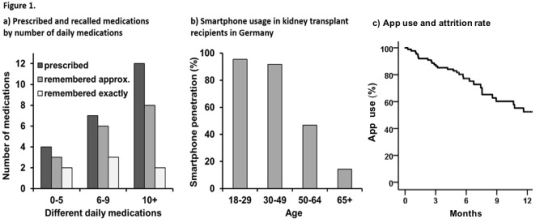A Mobile App to Improve Medication Adherence in Kidney Transplant Recipients – Analysis of a Prospective Interventional Study
F. Halleck, S. Georgi, D. Khadzhynov, D. Schmidt, E. Schrezenmeier, L. Lehner, P. Glander, K. Budde, O. Staeck.
Department of Nephrology and Medical Intensive Care, Charité
University Berlin, Berlin, Germany.
Meeting: 2018 American Transplant Congress
Abstract number: B202
Keywords: Kidney transplantation, Outcome
Session Information
Session Name: Poster Session B: Kidney Psychosocial
Session Type: Poster Session
Date: Sunday, June 3, 2018
Session Time: 6:00pm-7:00pm
 Presentation Time: 6:00pm-7:00pm
Presentation Time: 6:00pm-7:00pm
Location: Hall 4EF
Background: Non-adherence to medication is one of the leading problems for poor long-term outcome in kidney transplant recipients (KTR). Here we analyze the impact of a medication reminder app.
Methods: We initiated a prospective randomized controlled trial in our outpatient clinic in August 2016. Smartphone use, knowledge about own medication, interest in adherence assistance and recent adherence measured by 8-item Morisky Medication Adherence Scale (MMAS-8) were assessed. In the follow-up period attrition rate of app use and outcomes were analyzed. The study was approved by local ethics committee.
Results: 340 KTR were screened for study inclusion. 191 (56%) KTR had a smartphone, 159 (83%) were interested to use the app. 11 KTR could not participate due to missing technical requisites. In total 148 KTRs were randomized to the app or control group.
Medium age was 46 (12), medium time after kidney transplantation 5.2 years (3.0-9.8). Medium number of prescribed medications was 8.2 (3.2), prescribed pills/day 11.8 (4.7). Percentage of prescribed medications remembered exactly (name, dosage, schedule) was 39%, 74% were only remembered approximately. 34% admitted sometimes to forget to take their medication. 34% had +10 prescribed medications (median 12 drugs, 17 pills/day) of which only 2 (median) could be remembered exactly (Fig.1a).
Overall MMAS-8 was 6.8 (1.2), indicating medium adherence. Relationship between MMAS-8, number of prescribed medications, years after transplantation and age confirmed in a cox regression analysis independent correlation of younger age and shorter time post-transplant with worse adherence (rho 0.18; p=0.034 and 0.21; p=0.012). Notably, smartphone penetration was very high among younger KTR (92% in KTR <50 years (Fig. 1b). Attrition rate in app use at months 12 (n=88) was 54% (Fig. 1c).
Conclusions: KTR have deficits about the knowledge of their own medication. We suggest that medication reminder apps might support adherence particularly in younger KTR short-term after transplantation.
CITATION INFORMATION: Halleck F., Georgi S., Khadzhynov D., Schmidt D., Schrezenmeier E., Lehner L., Glander P., Budde K., Staeck O. A Mobile App to Improve Medication Adherence in Kidney Transplant Recipients – Analysis of a Prospective Interventional Study Am J Transplant. 2017;17 (suppl 3).
To cite this abstract in AMA style:
Halleck F, Georgi S, Khadzhynov D, Schmidt D, Schrezenmeier E, Lehner L, Glander P, Budde K, Staeck O. A Mobile App to Improve Medication Adherence in Kidney Transplant Recipients – Analysis of a Prospective Interventional Study [abstract]. https://atcmeetingabstracts.com/abstract/a-mobile-app-to-improve-medication-adherence-in-kidney-transplant-recipients-analysis-of-a-prospective-interventional-study/. Accessed February 22, 2026.« Back to 2018 American Transplant Congress

